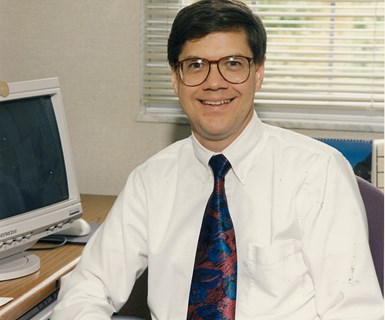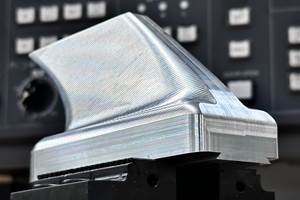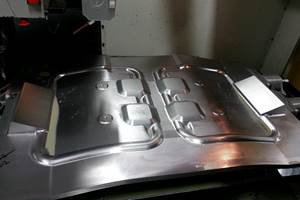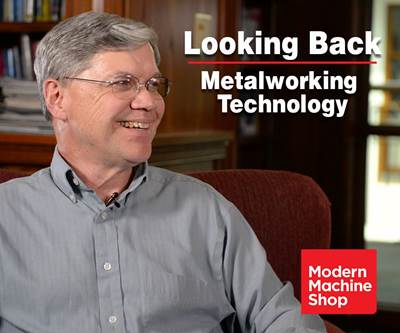The Sign on the Wall When I First Met Mark Albert: “When In Doubt, Tell the Truth”
Not just writing, but writing with integrity, is the work and the craft to which Mark Albert gave his career.
Share





“When in doubt, tell the truth.”

Photo of Mark Albert from the 1990s, around the time I first met him.
The first time I met Mark Albert in person, he had this motto taped to the wall of his office. He had printed a page with those words in large letters. I knew just enough about writing then to understand why that motto was worth displaying, and why a writer—a writer in his heart—would care about the importance of that motto.
I was working for a public relations firm that sometimes contributed to Modern Machine Shop. Mark had invited me to visit with the goal of teaching me how to send him more of the types of articles he could use. I don’t remember what we talked about, but I still remember the sign. That sign’s instruction still comes to my mind in the course of perhaps every third article I try to write.
When in doubt, tell the truth. Here is what that sign means to me:
To be a writer is to draw a circle. Everything in the world is interconnected, but the writer has to write a piece that stands alone. Maybe it will be 500 words or 3,000, but it will have a beginning and an end, and it will make one main point. The writer draws a circle to contain the story he or she wants to tell, and the circle can be drawn anywhere. It can be large or small. Yet however and wherever it’s drawn, the circle will contain some details and exclude others. What should be done about the tendrils of interconnection that cross the circle’s border?
For example, maybe the technology that eliminates tooling sometimes can’t do what tooling can. Maybe the machinist from a line of machinists actually has a richer career history from the years he spent in an unrelated field. Maybe the husband-and-wife owners growing the job shop at the heart of a seemingly compelling story have another business to which they give their interest and on which they hedge their bets. Confronted with complications such as these, the writer will always be tempted to overlook them, to make the lines of the circle more decisive than they actually are. Because the only other choice is to tell a messy story.
The real writer tells the messy story. Indeed, the real writer is the one willing to invest effort and craft into seeing and accepting the messiness and giving it its fair place for the sake of the truth.
Mark Albert is that kind of writer. He was that kind of writer all those years ago when he taped the sign to his wall. As you might have read by now, Mark is retiring after nearly four decades with Modern Machine Shop. His legacy fills a larger circle than I am drawing here, but I wish to highlight an aspect of his work that has shaped the magazine and me: not just his craft, as fine as that is, but his integrity within that craft.
Mark has always modeled that our work on MMS would involve not just publicizing machining technology, but writing about it. And not just writing about it, but doing so well. He has always held our readers' work and our work for them in such high regard, there was never any question but that it was worth our effort to fully understand the stories affecting them. Fully understand, that is, to the point of not glossing over—to the point of telling the messy truth.
Mark has taught far more lessons than this, of course. He has taught more lessons than he realizes. I hope to remember all of them, starting with that sign.
Related Content
Custom Workholding Principles to Live By
Workholding solutions can take on infinite forms and all would be correct to some degree. Follow these tips to help optimize custom workholding solutions.
Read MoreHow to Optimize Operator Efficiency on Any Shop Floor
Striking the perfect balance of person to machine is unique to each shop and can depend on a number of factors, including the type of work a shop undertakes, the available equipment, staffing levels, scheduling and more.
Read More4 Commonly Misapplied CNC Features
Misapplication of these important CNC features will result in wasted time, wasted or duplicated effort and/or wasted material.
Read More4 Tips for Staying Profitable in the Face of Change
After more than 40 years in business, this shop has learned how to adapt to stay profitable.
Read MoreRead Next
Mark Albert's Long-Running Monthly Column Marks Its End
My long string of monthly commentaries is coming to a close.
Read MoreMark Albert: Manufacturing as a Way of Making a Better World
In a video conversation with his MMS colleague, Mark Albert looks back on 39 years of reporting on the advance of metalworking technology.
Read More5 Rules of Thumb for Buying CNC Machine Tools
Use these tips to carefully plan your machine tool purchases and to avoid regretting your decision later.
Read More






























